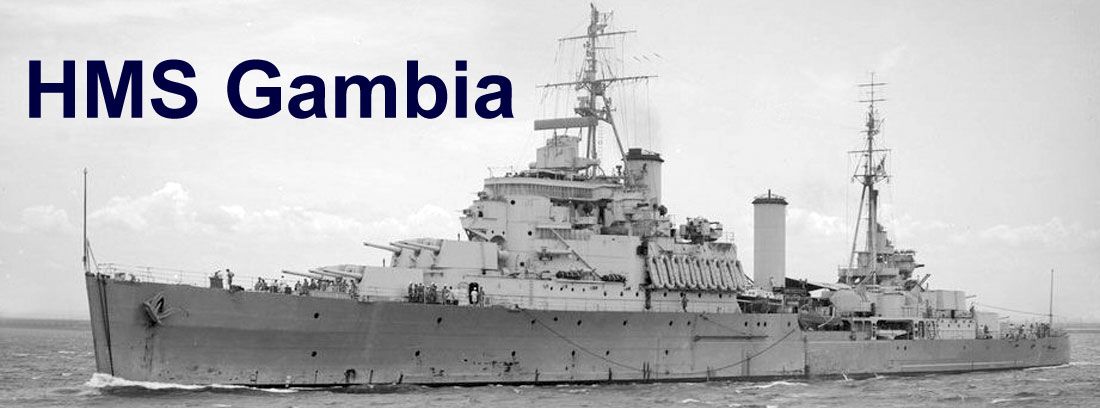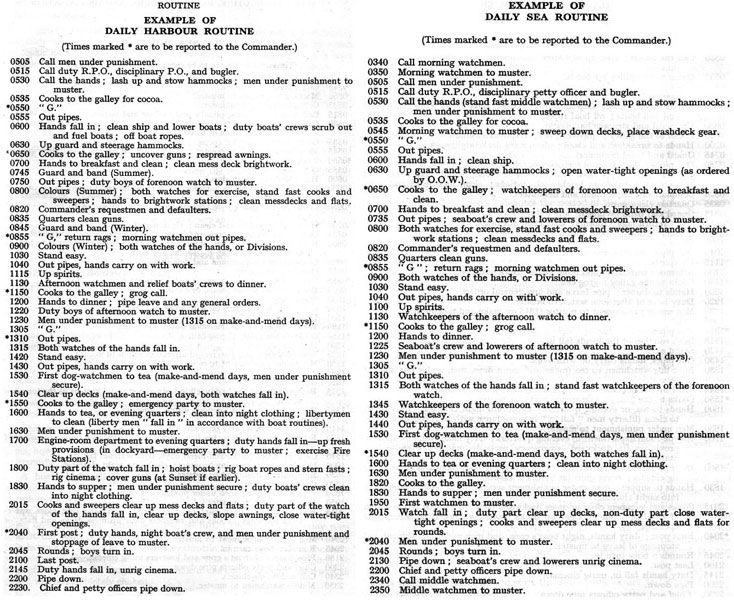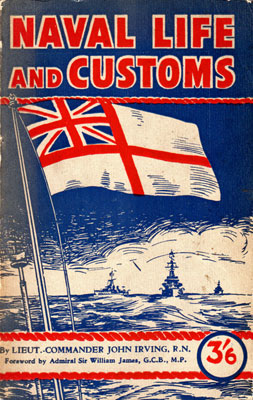
Ship's Routine
What was daily life on the ship like?
HMS Gambia was nearly always described as "a happy ship" in that life onboard was not too onerous. The officers were fair and usually as relaxed as navy regulations allowed them to be. The ship was cramped for the crewmen. The ship's sailing and fighting capabilities came first, creature comforts for the crew came after these.
John Eilbeck reported in the HMS Ganges Association Gazette that sometime in 1949 to 1950 that some modifications were made to HMS Gambia for the comfort of the crew:
Three cruisers of the Royal Navy, the Swiftsure, Ceylon and Gambia had been refitted and a number of comforts and amenities fitted. All electric bakeries and galleys, refrigerated stowage for fresh fruit and veg, drinking water coolers and ice cream soda bars (the Goffa [or Goffer] machine). Bathrooms updated, stainless steel wash-basins, each with a hot and cold water supply, and with shaving light and mirror over each basin. The Laundry extended (more space for ex-patriot Mainland China dhobymen), cinema and SRE provided.
The original HMS Gambia Association website contained two images of the daily crew routine, one for when in harbour and one for at sea. These are marked as example routines and are undated:

This is the harbour routine:
| 0505 | Call men under punishment. |
| 0515 | Call duty R.P.O., disciplinary P.O., and bugler. |
| 0530 | Call the hands; lash up and stow hammocks; men under punishment to muster. |
| 0535 | Cooks to the galley for cocoa. |
| *0550 | "G" |
| 0555 | Out pipes. |
| 0600 | Hands fall in; clean ship and lower boats; duty boats' crews scrub out and fuel boats; off boat ropes. |
| 0630 | Up guard and steerage hammocks. |
| *0650 | Cooks to the galley; uncover guns; respread awnings. |
| 0700 | Hands to breakfast and clean; clean mess deck brightwork. |
| 0745 | Guard and band (Summer). |
| 0750 | Out pipes; duty boys of forenoon watch to muster. |
| 0800 | Colours (Summer); both watches for exercise, stand fast cooks and sweepers; hands to brightwork stations: clean messdecks and flats. |
| 0820 | Commander's requestmen and defaulters. |
| 0835 | Quarters clean guns |
| 0845 | Guard and band (Winter). |
| *0855 | "G;" return rags; morning watchmen Out pipes. |
| 0900 | Colours (Winter); both watches of the hands, or Divisions. |
| 1030 | Stand easy. |
| 1040 | Out pipes, hands carry on with work. |
| 1115 | Up spirits. |
| 1130 | Afternoon watchmen and relief boats' crews to dinner. |
| *1150 | Cooks to the galley; grog call. |
| 1200 | Hands to dinner; pipe leave and any general orders. |
| 1220 | Duty boys of afternoon watch to muster. |
| 1230 | Men under punishment to muster (1315 on make-and-mend days). |
| 1305 | "G" |
| *1310 | Out pipes. |
| 1315 | Both watches of the hands fall in. |
| 1420 | Stand easy. |
| 1430 | Out pipes, hands carry on with work. |
| 1530 | First dog-watchmen to tea (make-and-mend days, men under punishment secure). |
| 1540 | Clear up decks (make-and-mend days, both watches fall in). |
| *1550 | Cooks to the galley; emergency party to muster. |
| 1600 | Hands to tea, or evening quarters; clean into night clothing; libertymen to clean (liberty men "fall in" in accordance with boat routines). |
| 1630 | Men under punishment to muster. |
| 1700 | Engine-room department to evening quarters; duty hands fall in - up fresh provisions (in dockyard—emergency party to muster; exercise Fire Stations). |
| 1800 | Duty part of the watch fall in; hoist boats; rig boat ropes and stern fasts; rig cinema; cover guns (at Sunset if earlier). |
| 1830 | Hands to supper; men under punishment secure; duty boats' crews clean into night clothing. |
| 2015 | Cooks and sweepers clear up mess decks and flats; duty part of the watch of the hands fall in, clear up decks, slope awnings, close water-tight openings |
| *2040 | First post; duty hands, night boat's crew, and men under punishment and stoppage of leave to muster. |
| 2045 | Rounds; boys turn in. |
| 2100 | Last post. |
| 2145 | Duty hands fall in, unrig cinema. |
| 2200 | Pipe down. |
| 2230 | Chief and petty officers pipe down. |
This is the sea routine:
| 0340 | Call morning watchmen. |
| 0350 | Morning watchmen to muster. |
| 0505 | Call men under punishment. |
| 0515 | Call duty R.P.O., disciplinary petty officer and bugler. |
| 0530 | Call the hands (stand fast middle watchmen); lash up and stow hammocks; men under punishment to muster. |
| 0535 | Cooks to the galley for cocoa. |
| 0545 | Morning watchmen to muster; sweep down decks, place washdeck gear. |
| *0550 | "G" |
| 0555 | Out pipes. |
| 0600 | Hands fall in; clean ship. |
| 0630 | Up guard and steerage hammocks; open water-tight openings (as ordered by O.O.W.). |
| *0650 | Cooks to the galley; watchkeepers of forenoon watch to breakfast and clean. |
| 0700 | Hands to breakfast and clean; clean messdeck brightwork. |
| 0735 | Out pipes; seaboat's crew and lowerers of forenoon watch to muster. |
| 0800 | Both watches for exercise, stand fast cooks and sweepers; hands to brightwork stations; clean messdecks and flats. |
| 0820 | Commander's requestmen and defaulters. |
| 0835 | Quarters clean guns. |
| *0855 | "G"; return rags; morning watchmen out pipes. |
| 0900 | Both watches of the hands, or Divisions. |
| 1030 | Stand easy. |
| 1040 | Out pipes, hands carry on with work. |
| 1100 | Up spirits. |
| 1130 | Watchkeepers of the afternoon watch to dinner. |
| *1150 | Cooks to the galley; grog call. |
| 1200 | Hands to dinner. |
| 1225 | Seaboat's crew and lowerers of afternoon watch to muster. |
| 1230 | Men under punishment to muster (1315 on make-and-mend days). |
| 1305 | "G" |
| 1310 | Out pipes. |
| 1315 | Both watches of the hands fall in; stand fast watchkeepers of the forenoon watch. |
| 1345 | Watchkeepers of the forenoon watch to muster. |
| 1430 | Stand easy. |
| 1440 | Out pipes, hands carry on with work. |
| 1530 | First dog-watchmen to tea (make-and-mend days, men under punishment secure). |
| *1540 | Clear up decks (make-and-mend days, both watches fall in). |
| 1600 | Hands to tea or evening quarters: clean into night clothing. |
| 1630 | Men under punishment to muster. |
| 1820 | Cooks to the galley. |
| 1830 | Hands to supper; men under punishment secure. |
| 1950 | First watchmen to muster. |
| 2015 | Watch fall in; duty part clear up decks, non-duty part close water-tight openings; cooks and sweepers clear up mess decks and flats for rounds. |
| *2040 | Men under punishment to muster. |
| 2045 | Rounds; boys turn in. |
| 2130 | Pipe down; seaboat's crew and lowerers unrig cinema. |
| 2200 | Chief and petty officers pipe down. |
| 2340 | Call middle watchmen. |
| 2350 | Middle watchmen to muster. |
Something I had not realized was that not all the routine work was done by the ships crews. The following comes from the HMS Victorious 1966-67 Commission Book...
Few of us appreciate the great service done by "K.P." and his teams of laundrymen, tailors and cobblers. We tend to take for granted the efficient laundry service, and the facilities provided onboard for tailoring K.P.'s Boys 43 and shoe-making and forget the hard work, often under unpleasant conditions, and very long separations from their families in Hong Kong, which is the lot of our "firms." If it were not for them we would have to provide our own laundry team from the Ship's Company and would have no tailoring or shoe repair facilities onboard. H.M. Ships on the Far East Station are allowed to employ these firms.
They are controlled by the Commodore-in-Charge Hong Kong and their insurance, contracts, price lists and personal record are all carefully scrutinised. How do these firms start? Take the story of K. P. Lau or Lau Kan Pui to quote his proper name. He started as an apprentice tailor in H.M.S. Unicorn in 1949 and in 1953 spent a year ashore in Hong Kong doing business with ships in the dockyard. From there he joined H.M.S. Chichester as No. 1 Boy in charge of the Tailor's Shop and about a year later transferred to H.M.S. Belfast. He first became his own boss with a small tailoring firm in H.M.S. Gambia and finally transferred to H.M.S. Victorious in 1960. He now employs 44 men in the three firms in Victorious as well as running the firms in H.M.S. Forth and a business in Kowloon.
 Gordon Smith's wonderful naval-history.net website is full of information including the text of Naval Life and Customs by Lt-Cdr John Irving, RN. It was published in 1944 by Sherratt & Hughes, Altrincham. According th that, the "G" mentioned in the routines above might mean a bugle's "single note - 'one 'G'' this is called. This is the signal for all divisional officers to report,"
Gordon Smith's wonderful naval-history.net website is full of information including the text of Naval Life and Customs by Lt-Cdr John Irving, RN. It was published in 1944 by Sherratt & Hughes, Altrincham. According th that, the "G" mentioned in the routines above might mean a bugle's "single note - 'one 'G'' this is called. This is the signal for all divisional officers to report,"
The scan is of the cover of my own copy of the book. It's a very interesting read.